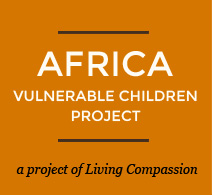Thursday evening, we created a space for silence and solitude until 9:30 am. We were up late Wednesday evening working on our web report and the opportunity for quiet and rest was welcomed by all. Our day’s agenda consisted mostly of errands—buying groceries, stopping by the bank, getting a needed computer cord from Ignatius’s house. We’ve learned that there is no such thing as a quick and simple outing for four white Americans in Zambia. We have learned to be prepared to slide in a business meeting amongst ourselves while waiting for someone to arrange transportation for us. We are also always armed with power bars and snacks, as “planning to be back by lunch” has proven to be a nice idea rather than something to bank on.
After hours on the town, and missing lunch at the friary, we returned home and headed straight for the kitchen. Alex chopped onions, Caverly peeled potatoes, Dave sliced up some carrots and Jen diced tomatoes. The fact that we’ve all been the Monastery cook at some point in time has prepared us well for efficiency in the kitchen when stomachs are grumbling. Before long, Jen was adding the dried soy protein product (TVP) that we discovered in Lusaka to our vegetable stew. While none of us could call the meal gourmet, it certainly hit the spot in that moment. It wasn’t until after we finished eating that Felix, the friary cook, made a special point to show us where the spices were kept. We figure he must have tasted the bland meal we made when we stepped out of the kitchen to eat.
We have been deeply touched by the kindness of the people we have met here. Being introduced to Felix is just one such example of such a meeting. He’s an extremely warm fellow who always greets us as if we’ve been his friend for years, and he has gone out of his way to be sure that we have everything we need.
Again and again, we are struck by the spirit of kindness and generosity within the people here. There’s nothing like being in Zambia to prove that it is not material objects or external circumstances that create happiness—that happiness is what is there when we aren’t busy attempting to control life.
Felix, for example, has two children, ages three and five, and a wife who he leaves each morning before the sun is up. After walking to the friary, he works long hours in the kitchen and does not return home until after all are in bed. By no American standards could his life be described as easy, and yet one would never sense that within his warm smile and outreached hand.
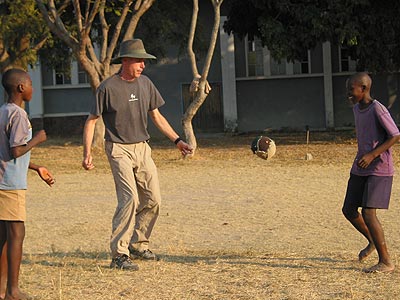
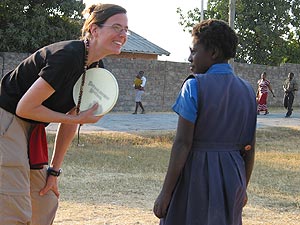
After our midday meal, for the first time this trip, we pulled out our Frisbees. In the field in front of the friary, many were gathered for games and conversation. It wasn’t long before Dave had joined some boys playing what we’d call oversized hacky sack with a handmade ball comprised of loosely stitched cloth. Here, the term ‘handmade’ is a rather silly one to use. Without the resources to buy whatever is desired, creativity becomes a required trait as opposed to a quality to artists or a select few. Whether it’s making a bell from an old railroad tie (as they did at the Masala Primary School) or turning a plastic lawn chair into a wheelchair, there are countless examples of how this creativity manifests.
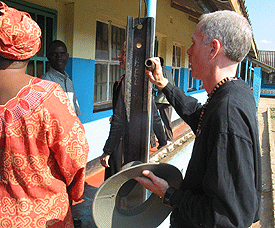
The children caught onto Frisbee with ease and quite a crowd collected to give the disc a whirl. As the afternoon began to bleed into early evening we left the field determined to make a quick toss of the Frisbee a daily ritual.
July 21, 2005 9:00 p.m.
We find ourselves gratefully back in Ndola after a beautiful trip to see the Victoria Falls. Now that we are finally back to a place with working computers and a reliable Internet connection, we are able to send you our daily reports.
Last you heard from us, we had visited the children in the Living Compassion house. Seven of the nine children in the house attend Masala Primary school. Some months ago, Ignatius informed us of the deplorable conditions there—malfunctioning toilets, backed-up sewer lines, hungry children, hungry teachers, a complete absence of books or any other school supplies, a lack of desks for the children to use, and many other things. As we prepared for our trip to Africa, we made it one of our first priorities to visit the school and see what we could do to help.
Tuesday evening we learned that Ignatius had made an appointment with the headmistress for 8:00 a.m. the next day. The next morning, after innumerable technical and logistical difficulties, we arrived at the school only and hour and a half late—fairly punctual by African standards—and met Mrs. Mupeta for the first time. She is a gracious energetic woman with (it became immediately apparent) a deep concern for the children in her charge and an eager desire to make a difference. Mrs. Mupeta invited us into her office and introduced us to the senior teachers of the school, who serve as her staff. We made our introductions and then she led on a tour.
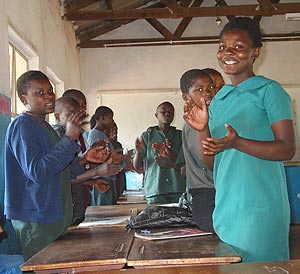 For the monks who are new to African culture, what followed was an experience unlike any we had ever had before. Mrs. Mupeta introduced us to each class in turn (about 20 in all) grades 1-7, and each class welcomed us as if we were royalty from some small country somewhere. In most cases they sang and danced their greetings for us and then answered our questions about the school and what they were learning. Never have you seen so many smiles or heard so much laughter—and this from children most of whom had not eaten that day and did not know when they next would eat.
For the monks who are new to African culture, what followed was an experience unlike any we had ever had before. Mrs. Mupeta introduced us to each class in turn (about 20 in all) grades 1-7, and each class welcomed us as if we were royalty from some small country somewhere. In most cases they sang and danced their greetings for us and then answered our questions about the school and what they were learning. Never have you seen so many smiles or heard so much laughter—and this from children most of whom had not eaten that day and did not know when they next would eat.
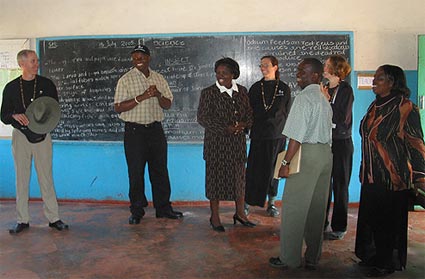
After meeting the children, we went to see the toilets. At one point, when the school was built in the colonial era, there were some three dozen toilets in two large buildings—now the school is down to nine, and none of them flush the way we are accustomed to. The pipes have all been stolen by vandals, so the children are required after using the toilet to dip water from a rusting, filthy gallon drum and pour it in the bowl to flush it. Often this is not even possible, because the water comes from the city water system which only works intermittingly. Mrs. Mupeta then took us outside to see the city sewer lines that run through the school property and by the toilet houses. She explained that the pipes were too small, causing sewage to back up and overflow through the toilets and onto the floor. The school has closed one of the toilet houses completely because of the dangers of disease.
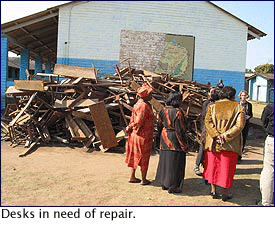 Next, Mrs. Mupeta showed us the home economics room. This room is plumbed with sinks and once housed a stove that was used to feed the children. For years now, they said, this has been impossible because of a lack of funds. The room is now filled with broken desks and chairs which the school has no resources to repair.
Next, Mrs. Mupeta showed us the home economics room. This room is plumbed with sinks and once housed a stove that was used to feed the children. For years now, they said, this has been impossible because of a lack of funds. The room is now filled with broken desks and chairs which the school has no resources to repair.
The experience was a sobering one, to say the least. The need was even more than we imagined. After the tour, we collected in Mrs. Mupeta’s office to talk. First we had an inspiring conversation about the possibilities we saw in our new partnership, and we spoke at length. Together we came up with these priorities:
To provide working toilets for the children. This is a large project as it requires diverting the current sewer lines. Replacing all the plumbing and the old toilets, and possibly either providing either a small water tower or a well (called a “bore hole” in Zambia.) While we are away, Mrs. Mupeta will seek to find someone who both has the skill and the compassion to head up this project for us.
To find a way to provide one meal each day to every child.
To assist with updating the electrical system (many of the classrooms do not have lighting currently.
To provide school books for the children.
To create a small library.
To repair classroom floors that are filled with holes and gullies.
Finally, after all of our business was done, we exchanged expressions of gratitude with Mrs. Mupeta and the other teachers. We received so much from those three hours—more than we could ever express—and we left feeling deeply inspired by the courage of our new friends and all of the Zambian people, that they can maintain such a spirit of generosity and love in the midst of all of their hardships.
After we returned to the friary, we had a late lunch of power bars brought from the States. None of us had the heart to eat in front of the children. Then we sat together in the grass near the entryway to the friary to process what had arisen in our hearts during the morning and before. This is an exercise we hope to perform daily, that we may support each other as we go along in remaining with ourselves in a place of self compassion. Even more than our desire than to help the people of Zambia, this is our first priority: that all of our experiences arise in a context of awareness practice, and that we use everything we see and everything we feel to see how we cause ourselves to suffer, so we can drop that and end suffering. The end of suffering, we know, must begin inside.
After our talk, we took a couple of hours in which to rest, ate supper with the friars, then, as it has become our habit, we worked late on the computer. At last, very tired and very happy, we went to bed.
